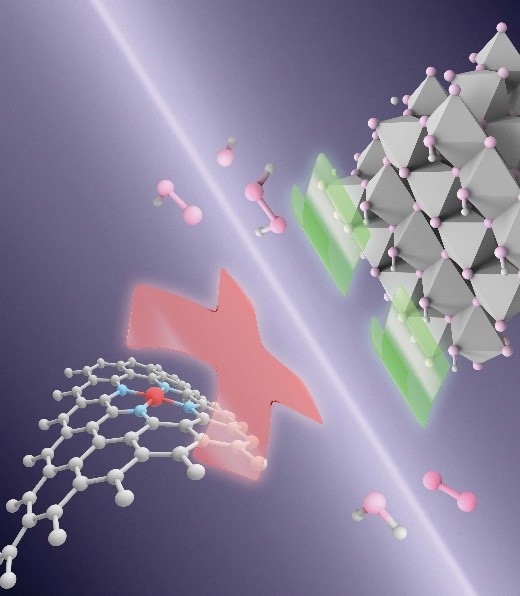Radical scavengers improve the durability of electrocatalysts
Liangbing Hu, a professor of materials science and engineering (MSE) at the University of Maryland (UMD), and Yuyan Shao, a materials scientist at the Pacific Northwest National Laboratory, have co-led a project to increase the durability of platinum group metal-free (PGM-free) electrocatalysts. The team used metal oxide nanoparticle additives to protect PGM-free electrocatalysts from the attack of the most powerful oxidizing radical, hydroxyl radicals (·OH), as demonstrated in a recent paper published March 25th in Nature Energy. Durable and highly active PGM-free electrocatalysts for oxygen reduction reaction is critical to reducing the the cost of the proton exchange membrane fuel cell systems. Fe and N co-doped carbon (Fe-N-C) materials present high ORR activity, whereas attacks from oxidizing radicals severely harm these electrocatalysts. The team used a Joule thermal pulse method to synthesize metal oxide (namely, Ta-TiOx) nanoparticles in the vicinity of the catalysts as scavengers to remove the ·OH radicals, and suppress the formation of H2O2. The scavenger nanoparticles decompose the radicals into H2O and O2 via a disproportionation reaction. Meanwhile, fuel cells with the scavengers showed a notable improvement in their ability to maintain the current density as compared to the cells without the scavenger additives. In this study, MSE Professor Mohamad Al-Sheikhly’s group utilized the electron paramagnetic resonance (EPR)-Spin Trapping method to directly demonstrate the effectiveness of the TaTiO2 nanoparticles in scavenging ·OH radicals were demonstrated. “Our prototype presents an active-defense strategy for improving the durability of catalysts by directly removing free radicals,” said Hua Xie, an MSE Assistant Research Scientist who served as first author of the paper. This study also included research teams from Queens College of the City University of New York, Washington University in St. Louis, UC Riverside, and University of Illinois Chicago. For additional information: Xie, Hua et al. (2022) “Ta–TiOx nanoparticles as radical scavengers to improve the durability of Fe–N–C oxygen reduction catalysts.” Nature Energy https://doi.org/10.1038/s41560-022-00988-w Xie, Hua et al. (2022) “Radical scavengers to protect platinum group metal-free electrocatalysts.” Nature Energy https://doi.org/10.1038/s41560-022-00989-9
April 5, 2022 Prev Next |


